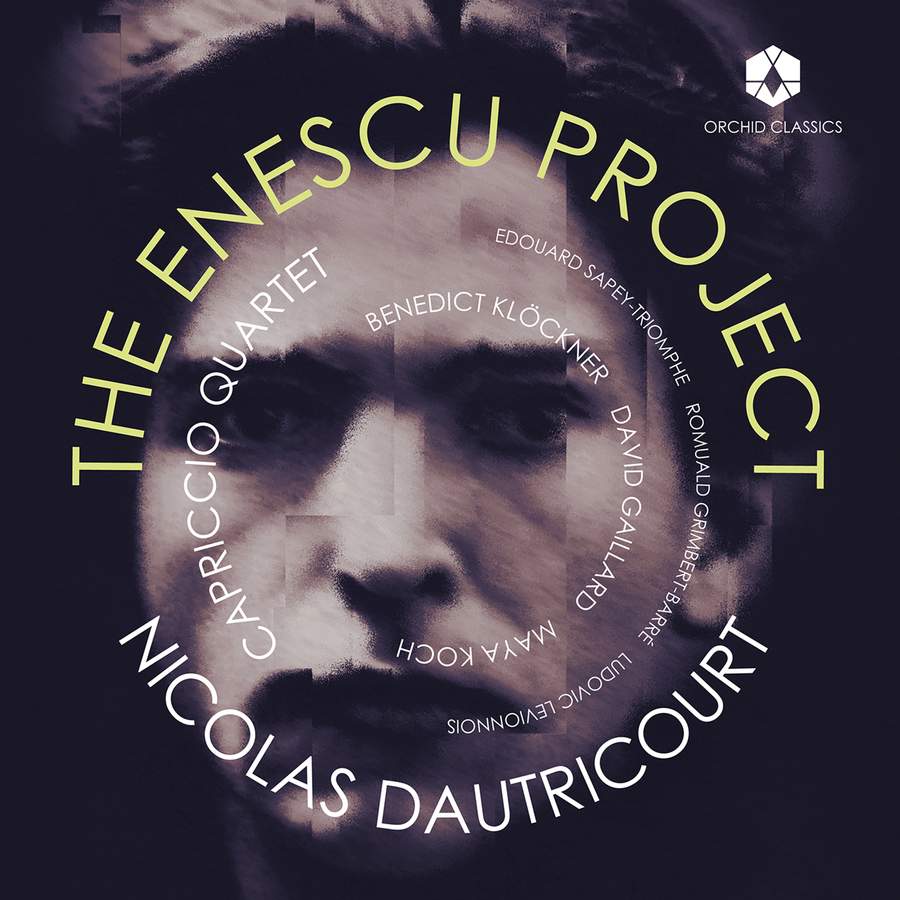The Enescu Project
View record and artist detailsRecord and Artist Details
Genre:
Chamber
Label: Orchid Classics
Magazine Review Date: AW22
Media Format: CD or Download
Media Runtime: 79
Mastering:
DDD
Catalogue Number: ORC100202

Tracks:
| Composition | Artist Credit |
|---|---|
| Aubade |
George Enescu, Composer
Cécile Agator, Violin Flore-Anne Brosseau, Viola Samuel Etienne, Cello |
| Thaïs, Movement: Méditation |
Jules (Emile Frédéric) Massenet, Composer
Cécile Agator, Violin |
| (44) Duos, Movement: Wallachian dance |
Béla Bartók, Composer
Cécile Agator, Violin Nicolas Dautricourt, Violin |
| (44) Duos, Movement: Ruthenian song |
Béla Bartók, Composer
Cécile Agator, Violin Nicolas Dautricourt, Violin |
| (6) Sonatas for Solo Violin, Movement: No. 3 in D minor (Ballade) |
Eugène (Auguste) Ysaÿe, Composer
Nicolas Dautricourt, Violin |
| Mémoire déformée, hommage à George Enescu for String Octet |
George-Ioan Păiș, Composer
Capriccio Quartet Edouard Sapey-Triomphe, Cello Ludovic Levionnois, Viola Nicolas Dautricourt, Violin Romuald Grimbert-Barré, Violin |
| Elégie |
Gabriel Fauré, Composer
Benedict Klöckner, Cello Capriccio Quartet |
| Pavane pour une Infante défunte |
Maurice Ravel, Composer
Capriccio Quartet Nicolas Dautricourt, Violin |
| Octet |
George Enescu, Composer
Benedict Klöckner, Cello Capriccio Quartet David Gaillard, Viola Maya Koch, Violin Nicolas Dautricourt, Violin |
Author: Guy Rickards
This might be more precisely named ‘The Enescu Octet Project’, since it was prompted by Nicolas Dautricourt’s chance discovery (in 2015) of this youthful masterwork by the great Romanian composer. Dautricourt built a programme to set a context for the Octet (1900), in his view ‘one of the greatest masterpieces of the chamber music repertoire, or perhaps of music altogether’, and who am I to dissent?
Dautricourt’s programme – including pieces by Enescu’s contemporaries, teachers and successors – was played at the 2021 George Enescu Festival in Bucharest, repeated on this lovingly performed album, though only Dautricourt and the Capriccio Quartet continued to the recording. Naturally string-based, following Enescu’s Op 7, the textures range from Dautricourt’s unaccompanied solo in Ysaÿe’s wonderful Third Sonata, Ballade (dedicated to Enescu, of course), to the full Octet, heard in George-Ioan Păiș’s eloquent Mémoire déformée, winner of the composition competition that was part of the Project. Along the way we have three of Bartók’s 44 Duos for two violins – livening up proceedings after the gentle introduction of Enescu’s 1899 Aubade for string trio – and arrangements of standards by Fauré, Massenet and Ravel.
The Octet formed the second half of the original concert and here concludes the album, towering over the rest of the programme both in terms of length (almost 39 minutes in this radiant account) and quality. It is to Enescu what the Midsummer Night’s Dream Overture was to Mendelssohn: a huge qualitative leap forwards (the Aubade, pleasing as it is, cannot hold a candle to the Octet) signalling to all that a major composer had arrived. The style is very turn-of-the-century, with resonances wider than those Dautricourt gathered – it would have been instructive to have included Verklärte Nacht – and the opening movement ends with a marked pre-echo of Shostakovich, who also penned a youthful octet. Still, what we have is very fine, beautifully performed, giving Warner’s highly regarded rival led by Vilde Frang a run for its money. Strongly recommended to all.
Discover the world's largest classical music catalogue with Presto Music.

Gramophone Digital Club
- Digital Edition
- Digital Archive
- Reviews Database
- Full website access
From £8.75 / month
Subscribe
Gramophone Full Club
- Print Edition
- Digital Edition
- Digital Archive
- Reviews Database
- Full website access
From £11.00 / month
Subscribe
If you are a library, university or other organisation that would be interested in an institutional subscription to Gramophone please click here for further information.




